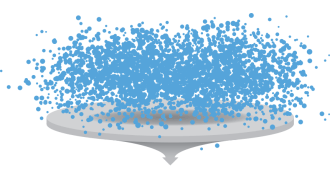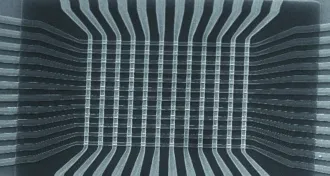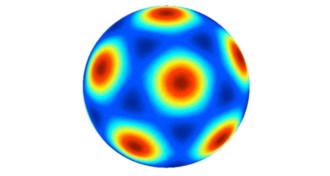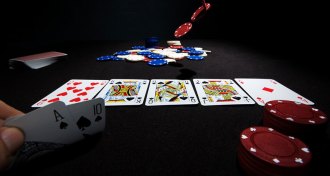Computing
-
 Genetics
GeneticsEnormous quantities may soon be called ‘genomical’
Genetic data may soon reach beyond astronomical proportions.
-
 Chemistry
ChemistryQuantum chemistry may be a shortcut to life-changing compounds
Quantum chemistry could launch a manufacturing revolution, helping to identify materials for improved solar cells, better batteries or more effective medicines.
-
 Math
MathComputer program rivals top poker players in complex card game
A computer program held its own against the world’s best heads-up no-limit Texas Hold’em poker players.
By Andrew Grant -
 Computing
ComputingResistors that remember help circuits learn
Electronic components called memristors have enabled a simple computing circuit to learn to perform a task from experience.
By Andrew Grant -
 Neuroscience
NeuroscienceBrain’s grid cells could navigate a curvy world
If we ever need to flee a dying Earth on curved space islands — as humanity was forced to do in 'Interstellar' — our brains will adapt with ease, a new mathematical analysis suggests.
-
 Science & Society
Science & SocietyUnbiased computer confirms media bias
A computer algorithm can identify a media outlet’s bias just by the quotes it chooses from political speeches, surrounding context aside.
-
 Computing
ComputingConcerns about drones, how to hunt exoplanets and more reader feedback
Readers discuss the potential impacts of human-made fliers and muse about the advantages a poker-playing computer program has over human opponents.
-
 Computing
ComputingArtificial intelligence conquers Space Invaders, Pong, Q*bert
With a single algorithm, a computer can learn dozens of classic video games, researchers from Google DeepMind in London report.
-
 Health & Medicine
Health & MedicineAllergy-related Google searches follow pollen season ups and downs
Google search queries could help researchers track pollen seasons in areas without pollen-monitoring stations.
-
 Computing
ComputingNew computer algorithm plays poker almost perfectly
An algorithm optimized to play heads-up limit Texas Hold’em poker will never lose in the long run against any opponent.
By Andrew Grant -
 Computing
Computing‘The Imitation Game’ entertains at the expense of accuracy
Inaccuracies weaken “The Imitation Game,” an otherwise enjoyable film about Alan Turing breaking the Enigma code during World War II.
By Andrew Grant -
 Quantum Physics
Quantum PhysicsMilestone algorithm runs on quantum computer
An algorithm proposed two decades ago that demonstrated the benefit of using quantum mechanics to solve certain problems has finally been run on a quantum computer.
By Andrew Grant